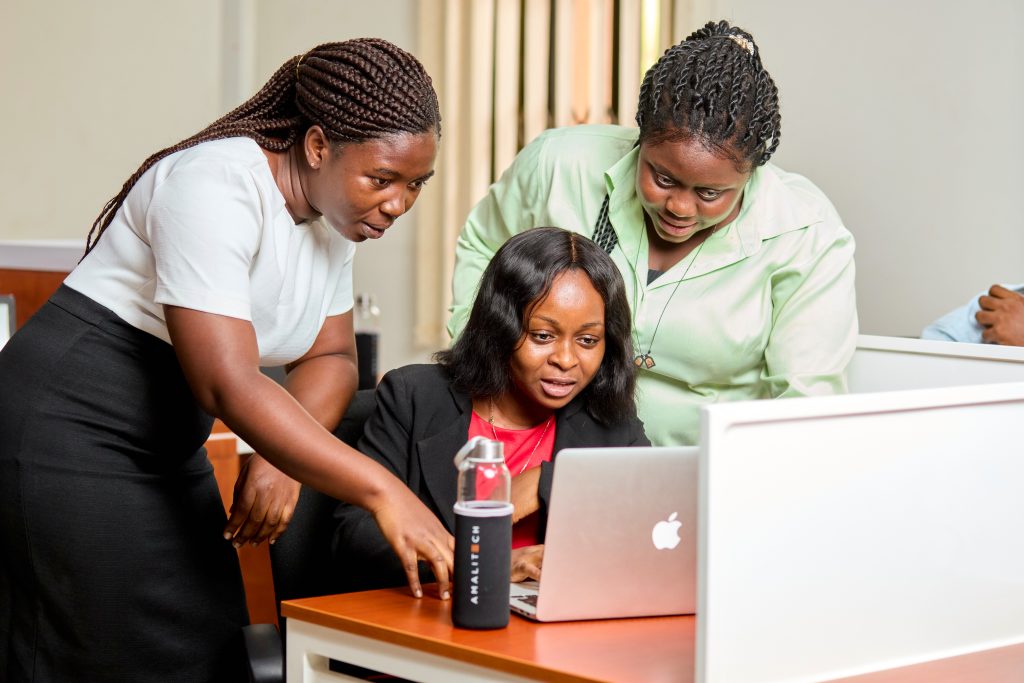Takoradi, Aug. 19 – Today, Germany lacks 96,000 IT specialists. As a study by the Boston Consulting Group (BCG) reveals, this number will increase every year and by 2030 there could be a shortage of more than one million specialists in the digital sector in Germany. The driving force behind this development is the fast pace of digitalisation worldwide.
In Africa on the other hand, 2.2 million ICT graduates are leaving universities every year with limited job opportunities. However, these digital specialists are more in demand than ever before in other parts of the world. Nevertheless, there is a lack of practical experience and knowledge about the demands of the requesting countries.
AmaliTech Provides ICT Employment in Africa
Founded in 2019, AmaliTech provides employment pathways in the tech sector to young graduates in Sub-Saharan Africa, connecting them to the global demand for tech talent. AmaliTech’s approach combines training with employment. After completion of free three-to-nine-month training, successful graduates receive a job offer in one of the AmaliTech service centres, in Takoradi or Accra, Ghana or in Kigali, Rwanda, where they closely collaborate with international clients on digital projects with skills in the area of software development and data science.
Matthew Darkwa, Director of Operations explains: “Through our approach new jobs are created directly and indirectly as the salaries are spent locally, therefore we are creating opportunities and building ecosystems in local communities and secondary cities. At AmaliTech we have already created over 160 jobs.”
Martin Hecker, Founder and CEO of AmaliTech adds:” We offer long-term, above-market value, high-quality jobs with the opportunity for continuous development. Our employees have the chance to be promoted on a regular basis and receive a higher salary. Health insurance and a pension are included in the employment contracts.”
AmaliTech’s customers confirm the quality of the training and the results achieved. For example, the German company nexum AG: “We have been cooperating with AmaliTech since 2020 and visit our partner regularly in Ghana. As part of the global IT training programme, we have trained more than 40 experts from Ghana in web-based cloud systems such as Salesforce and content management systems e.g., Magnolia. And we will enhance our joint activities significantly in the upcoming months and years to come.
Currently, we are building a software testing and quality assurance team. Our commitment in Ghana has a clear strategic impact and aims at a long-term growing partnership – quality, agility and enthusiasm convinced us from the start. Today, our development teams work very successfully hand-in-hand across continents for global client projects,” says Georg Kühl, CEO nexum AG.

Triple Benefit
The cooperation model between Africa and Europe has a triple benefit. Not only does it create jobs in Africa and alleviates the shortage of skilled workers in Europe. In addition, all surpluses generated are fully reinvested in social projects in Africa.
AmaliTech enables young people to receive a scholarship and organises coding boot camps for the targeted promotion of women in the tech sector. Over 250 women participated in our webinars and boot camps which were offered to equip women with digital skills to enhance employability and maximise their potential. AmaliTech supports high-quality IT education in schools in Ghana to lay the foundations for a future-proof, innovative economy. In addition, 1200 children between 9 and 14 have already received programming lessons at schools in Ghana with our programme “CodingForKids”.
About AmaliTech gGmbH:
AmaliTech is a social enterprise that harnesses the potential of remote working to build the future of work in Sub-Saharan Africa. AmaliTech provides employment pathways in the tech sector to young graduates in Sub-Saharan Africa, connecting them to the global demand for tech talent.
The approach combines training with employment and continuous learning. By focusing on skilled ICT services, we contribute to ecosystem development and the emergence of a future-proof industry with growth engine potential.
Through the UN’s Decent Jobs for Youth Initiative, AmaliTech has committed to train over 3,000 individuals and create more than 1,000 direct jobs in Ghana and Rwanda by 2025.
AmaliTech puts inclusion front and centre: investing in women empowerment, integrating people with disabilities into the workplace, and bringing digital skills to high schools.
AmaliTech is a partner of German development cooperation via the “Invest for Jobs” initiative implemented by GIZ and KfW.